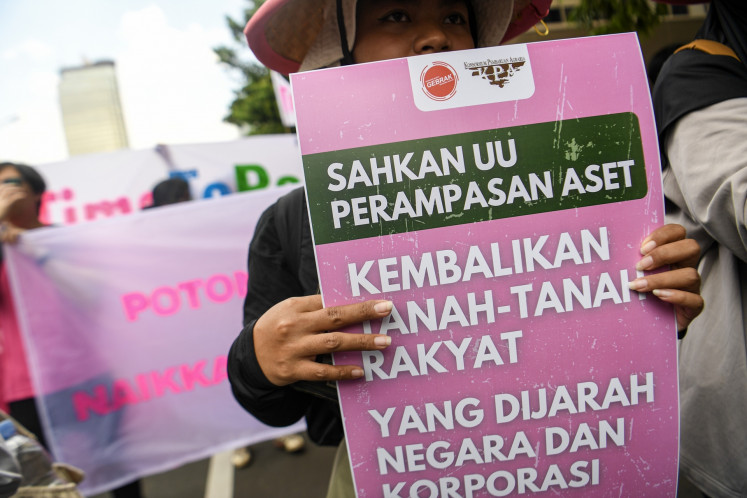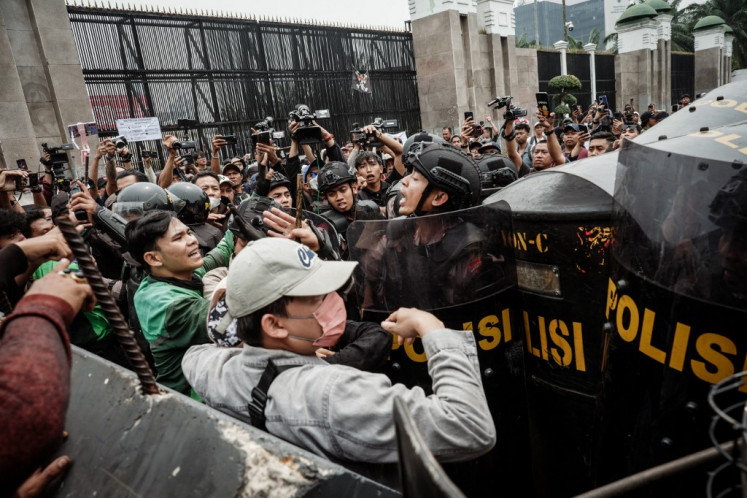Popular Reads
Top Results
Can't find what you're looking for?
View all search resultsPopular Reads
Top Results
Can't find what you're looking for?
View all search resultsJokowi faces uphill battle to pass omnibus bills
President Joko "Jokowi" Widodo is facing hurdles in getting landmark omnibus bills passed as the legislature plans to consult with labor unions following protests and experts call for a more sustainable approach
Change text size
Gift Premium Articles
to Anyone
P
resident Joko "Jokowi" Widodo is facing hurdles in getting landmark omnibus bills passed as the legislature plans to consult with labor unions following protests and experts call for a more sustainable approach.
During his inauguration speech in October, Jokowi announced a plan to draft at least three omnibus bills on the economic front, namely on job creation, taxation and small and medium enterprises (SMEs).
The President asked his Cabinet on Wednesday to conclude the drafting of the bill on job creation over the weekend so that the government could submit it to the House of Representatives for deliberation this week.
"It would take 50 years to revise the laws one by one. If the House can work on it quickly, this would be a big leap for our services to the people, businesses and SMEs, which can contribute significantly to economic growth," said Jokowi on Wednesday.
He also told his Cabinet on the same day that he expected the bill deliberations at the House to take no more than 100 working days.
The bill on job creation is seen as essential for the government as it struggles to attract investment into the country to help improve economic growth. If passed, the omnibus law will amend about 1,200 articles in more than 80 prevailing laws, including the Labor Law, which have been blamed for hampering investment in the country.
Centre for Strategic and International Studies (CSIS) economic department head Yose Rizal Damuri told The Jakarta Post that it would not be easy for the government and the House to pass the bill within 100 days as they would need to provide academic scripts, public consultation and political support.
Commission XI lawmaker from the Indonesian Democratic Party of Struggle (PDI-P) Hendrawan Supratikno also said the House would need about 150 days to pass the bill as the legislature would need to hold discussions with, and accommodate the aspirations of, various groups.
“We need to wait and assess the credibility of the arguments put forward by the government and whether it has taken into account all the consequences,” said Yose. “We need to acknowledge that labor issues have hampered investment.”
Labor unions have expressed their opposition to the bill, saying it would undermine labor rights. They staged a protest in front of the House complex in Jakarta on Jan. 13 with a smaller crowd marching at Tanjung Priok Port in North Jakarta on Jan. 9.
"Thousands will gather again in front of the House and in 19 other provinces on Monday [Jan. 20] to protest the bill," Confederation of Indonesian Trade Unions (KSPI) president Said Iqbal said last week. "We need to remind them not to pass a law at the expense of workers."
The House Commission IX overseeing manpower said it was planning to establish a team consisting of lawmakers and labor union representatives to address the latter’s protests against the bill.
The government stated that minimum wage would not be reduced and would be based on regional economic growth in the bill. It would also provide contract workers with the same benefits as permanent workers and allow companies to provide wages based on working hours for several professions, such as consultants and part-time workers, among other things.
“We need to make sure that minimum wage is not be reduced in the omnibus bill,” said Office of the Coordinating Economic Minister secretary Susiwijono on Friday. “We also declined to lower severance pay, reduce social security or outsource unskilled foreign workers.”
Aside from the job cluster, the job creation bill will touch on 10 other clusters, namely license procurement simplification, investment requirements, protection and empowerment of micro, small and medium enterprises, ease of doing business, research and innovation support, government administration, sanctions, land procurement, economic zones and government investment and projects.
The bill is expected to ease doing business in the country, attract foreign investment and, in turn, create jobs.
The government will also ease permit requirements for the construction of small-scale buildings and scrap Environmental Impact Analysis (Amdal) and building permit (IMB) requirements for low-risk investments.
Jakarta Property Institute executive director Wendy Haryanto said the removal of the requirement for an Amdal and IMB could only be done if the government improved the implementation of detailed spatial plan (RDTR) and strategic environmental assessment (KLHS), stressing that a more sustainable approach in land procurement was needed.
"Both the Amdal and IMB could take up to four years to process so there is red tape. We need to remove these requirements but only after the RDTR and KLHS implementations are strengthened," Wendy said, adding that the country lacked regional environmental assessments.
The government also plans to introduce an omnibus bill on taxation, which would effectively lower corporate income tax from the current 25 percent to 20 percent by 2023. It would also lower tax penalties, ease income tax regulations for expatriates and work toward taxing multinational digital firms that have no physical presence in Indonesia yet benefit from activities in the Indonesian market.
“The trade-off for the omnibus is that the government must anticipate lower tax revenue such as by taxing digital companies operating in Indonesia, including Netflix and Spotify,” Center for Indonesia Taxation Analysis (CITA) executive director Yustinus Prastowo said, adding that “it also needs to broaden the taxpayer base to compensate for the lost tax revenue”.










